In loving memory of Josef Schweighofer, October 27, 1940 – October 29, 2020. Du bleibst in unserem Herzen.
World War II. Most of us know it from the American point of view – sons, brothers and sweethearts being sent overseas. Scrap drives, Red Cross fundraisers and Rosie the Riveter posters for those left stateside. My own grandmother Nancy (born in 1931) was a child in St. Louis, Missouri during this time. But what was it like to be a child on the other side of the ocean, right in the middle of the action? To find out that and more, I sat down with my Austrian husband’s grandparents, Josef (Sepp) and Anna Schweighofer, born in 1940 and 1939, respectively. Here’s what Oma and Opa had to say:
Sepp and Anna as children in Austria, early 1940s
1. What was a normal day for you as a child?
Opa: I lived on a farm in a small village: Zell am Moos, Austria. My family had a cow, two horses, a bull, a calf, a pig, hens and sheep. We didn’t have a tractor, so we had to rake the hay ourselves. We would get up at 5:00 a.m. and do chores before school.
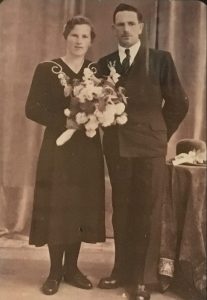
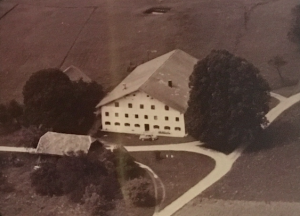
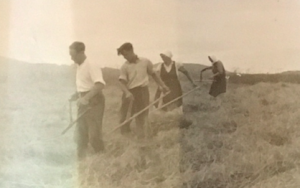
Since we only had one teacher at our school, the older kids went to school in the morning, and then the younger kids went in the afternoon. After school we had to do more work on the farm. We usually didn’t have time for homework, but the teachers didn’t mind – They knew we all had a lot of work to do at home. If we had some time left over at night, we would do the homework then.
Oma: I grew up in Laiter, one town over from Zell am Moos and next door to where we live now. My family also had a farm, but much smaller than Opa’s. And it was a full house – my grandmother, aunt and two cousins lived there with my father, mother, sister and me. My grandmother was bedridden from the year I was born, 1939, until the year she died (1954). My aunt took care of her that whole time! We also had 2 or 3 cows, and my mother took care of all the farm work. My father was a rake maker for the farmers, so that kept him busy. Everyone would always come to our house to buy the rakes.
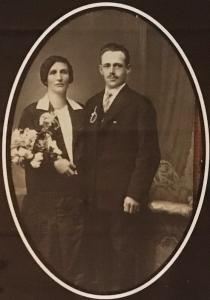
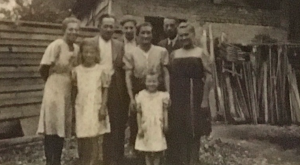
My father was also the “Kapellmeister”, or music director, of the town’s band for 50 years – from 1920 until 1970. And the band practiced in our house! So between the rakes and the band, he had no time to help Mother with the farm work. I actually didn’t have to help as much as my older sister Frieda did. She was five years older than me and had to do everything.
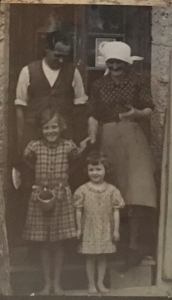
Our school was over a mile away (2 kilometers), and it took us about an hour to walk there with our little legs. We had no books, so had to copy everything down ourselves. When we got home we would do our homework and help around the house and farm. Sometimes we would visit with my cousin, who was ten years older than me. She could sew and make her own clothes. At that time, if you needed something, you made it yourself.
2. When I first met you, Oma, I was very excited to find out that your aunt was the cook for the real von Trapp family, since one of my favorite movies is Sound of Music! What do you remember about her?
Aunt Aloisia had a hard life. Her father had died young, and her brother was in an Italian prisoner of war camp for all of World War I. When she got married, she moved to Mondsee (author’s note: the location of the church where Maria got married in the Sound of Music). She and her husband had two children together. Sadly, her husband got into a bike accident one day and ended up passing away, leaving her all alone with the two kids. I wasn’t born yet, but she told us that she was at the doctor in Mondsee some time after that and was looking for a job in the newspaper ads. She found the advertisement for a job as a cook for the von Trapp family in nearby Salzburg – although the family was obviously not famous yet!
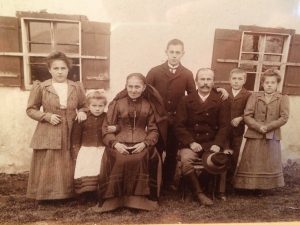
Aunt Aloisia applied for the job and ended up being hired as the family’s cook. But that meant she had to move in to their house in Salzburg and leave her two little children behind with her sister, who lived with my family. Aloisia would come home to visit when she could, and sometimes she would even get to bring the von Trapp girls’ outgrown dresses home for her own kids to wear. Since I wasn’t alive then, I don’t really remember any particular stories, but I know she liked the family. In 1938, when the Captain and Maria decided to leave the Nazi regime in Austria to go sing in America, they asked my aunt to go with them. She was touched, but of course did not want to leave her own children behind. She stayed in Austria, and the von Trapps always made a point to come visit her whenever they were back in the country.
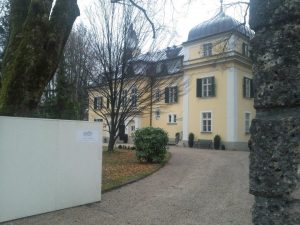
3. Do you have any memories of World War II (1939 – 1945, Oma, birth until age 6, Opa, birth until age 5)?
Oma: One stands out in particular – my older sister and her friends would always take the train to school, which was in a nearby village called Frankenmarkt. But one day in 1944, when the kids were in their classroom, the Allies bombed the town and the surrounding railways. With the trains out of service, my ten-year-old sister and her friends had no way to get home. They ended up having to walk home all by themselves – a nine-mile walk, for ten-year-olds, and they didn’t know the way! Their parents back at home had no way of knowing where their kids were and if they were safe – they were really worried and had no way of contacting them. It was a scary day for everyone.
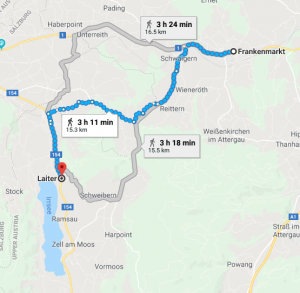
That’s one of my strongest memories, but I also remember that throughout the whole war, there were people that died from every house in our neighborhood. Houses would get notices that one of their male family members had died in the war.
I also remember the blackout curtains that we had to put up every night, so the planes couldn’t see us, as well as the tinsel that the planes would drop down.
What tinsel?
Opa: It was tinsel that seemed to fall from the sky. We didn’t know why the planes did that, but maybe to mess with the radar signal of the German planes.
Oma: Well, for whatever reason they did it, we didn’t mind. We didn’t have any Christmas ornaments, so we hung the tinsel that we picked up off the ground on our tree to make it more festive!
4. Do you remember the war ending (Oma – age 6, Opa, almost 5?)
Oma: I remember that only one house had a radio, so all the men would go there to listen. We had known that Germany was losing for a while, so we were relieved when we found out it was finally over. And then the Americans came and they were really nice.
5. What was it like with the Americans occupying your part of Austria (1945-1955, Oma age 6-16, Opa age 5-15)?
Opa: When I was about nine years old, I came home to find an American tank on our farm, with American soldiers standing around it. They motioned to me, saying, “Come here, little boy!” I went up to them, and they politely asked me to go buy them beer in the village. They gave me 100 schillings (approx. $8.00), which was more money that I had ever seen in my life. I took the money, ran to the village and bought the beer for them. But when I got back, the American soldiers and the tank were gone! I waited for them to come back, but days went by and they never returned. This meant that I was left with all of the change from buying the beer – 90 schillings, a lot of money for a nine-year-old boy! I saved the money and eventually bought my first motorcycle using that as my start.
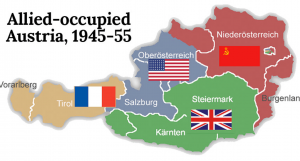
Oma: We actually had two American soldiers staying in our house, as did many other houses in our neighborhood. We were required to give them room and board. But they were really nice. I remember that they loved scrambled eggs – my mom would make it for them every day!
So the people liked the soldiers?
Yes, the Americans were really kind. The soldiers gave us kids chocolate and were always friendly. The people in Linz weren’t as lucky. They were occupied by the Russians, and that’s where you heard horrible stories of how the soldiers treated people.

6. What were those post-war years like?
Oma: Times were hard after the war. I remember we would hide bread if we got it so we would have it for later. We also had gray material that we had to make clothes from, and I remember that it was really itchy.
Besides the two American soldiers, we also had some other people staying at our house. A refugee from Czechoslovakia came to our village and ended up moving in with us. His wife and children also eventually came over, and we rearranged so that the family could have one room to themselves. They got more ration cards since they were refugees, and they would share the cards and the food with us. Eventually, they built a house next door to us and moved in there. It’s still standing today!
We also had a Frenchman staying with us after the war. Both he and the Czech refugee helped around the farm and with the rakes in exchange for their room and board. One day, the Frenchman decided to leave, but I don’t know why. He left behind a letter for my parents to send to his family if he didn’t return. But since he wasn’t legally allowed to have been staying at our house, we were too nervous to send the letter. So we never did.
Opa: We had a Russian farmhand staying at our house after the war. He was very nice and very helpful around the farm.
7. Moving forward a bit in time, how did you two meet each other (late 1950s)?
Opa: We were 18 or 19 years old. Oma was a waitress in Oberhofen (nearby village) and I came into the restaurant one day.
Oma: Yes, I remember he was sitting over in a corner, and I thought to myself, “Who is that good-looking guy?”
Opa: But nothing really happened right away. We had some group events and we danced with each other at those, and we also went to friends’ houses and spent some time together there.
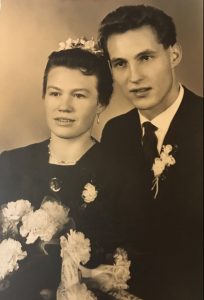
8. What were the first years like as a married couple (early 1960s)?
We built our own house that first year, and eventually moved in with our new baby Rosemarie. But when we moved in, the windows on the top floor weren’t installed yet. That was a problem, because our bedrooms were on that top floor. And as our luck would have it, that year was one of the coldest, snowiest winters we had ever seen. Snow kept blowing in our bedroom windows! Needless to say, we very much appreciated having windows that next winter.
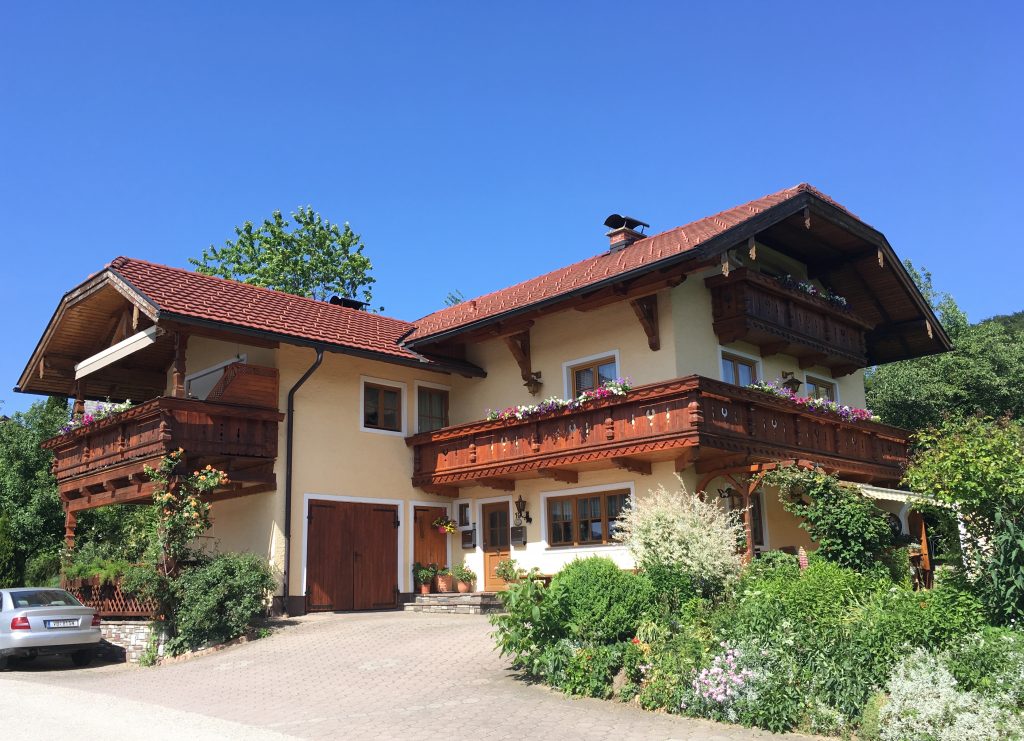
When we built the house, we knew we eventually wanted to have a bed and breakfast, so we built it with that in mind. Laiter is right on Lake Irrsee and in the famous Salzkammergut region, so we hoped that guests would come from far and wide. We were so excited when we opened the doors in 1965. Our bed and breakfast wasn’t anything sophisticated – we just had one room for the guests, with six beds in the room. We didn’t have a shower, but we did have running water. Not every bed and breakfast had running water at the time, so we were very proud of that. And the tourist office made a special point of advertising that feature as well!
And the guests did come from far and wide! As soon as one car would leave, another car full of vacationers would show up. We had many visitors from Germany and other parts of Austria, but also from Hungary and other parts of Europe – we even had one man come all the way from Uruguay!
Since the guests took up one room, our four daughters slept together in the other. The guests loved our daughters and would often bring them presents. We would have repeat guests over the years, and we grew to have a special relationship with many of them. We would even send each other Christmas cards! Having the bed and breakfast brought us many happy memories and, best of all, many meaningful friendships.
Author: Today, Anna and Sepp still live in their same house in Laiter, which has also been home to many memories for their own growing family. Complete with four daughters and their significant others, five grandchildren and their significant others and five great-grandchildren (who, at ages 11 and under, have no boyfriends or girlfriends yet!), the family gathers at their beautiful home for every special occasion. As the lone American, I’ve been welcomed into their Austrian family with open arms – although maybe next time I’l have to follow in the footsteps of my 1940s countrymen and bring them all chocolates!

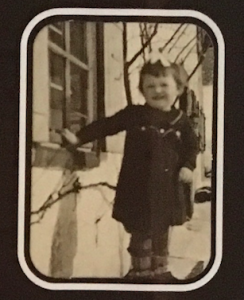
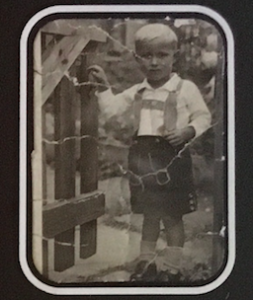
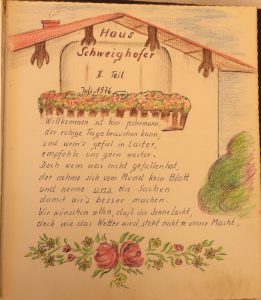
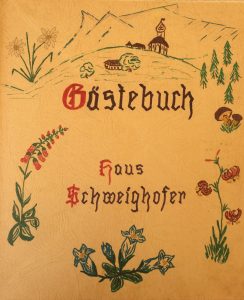
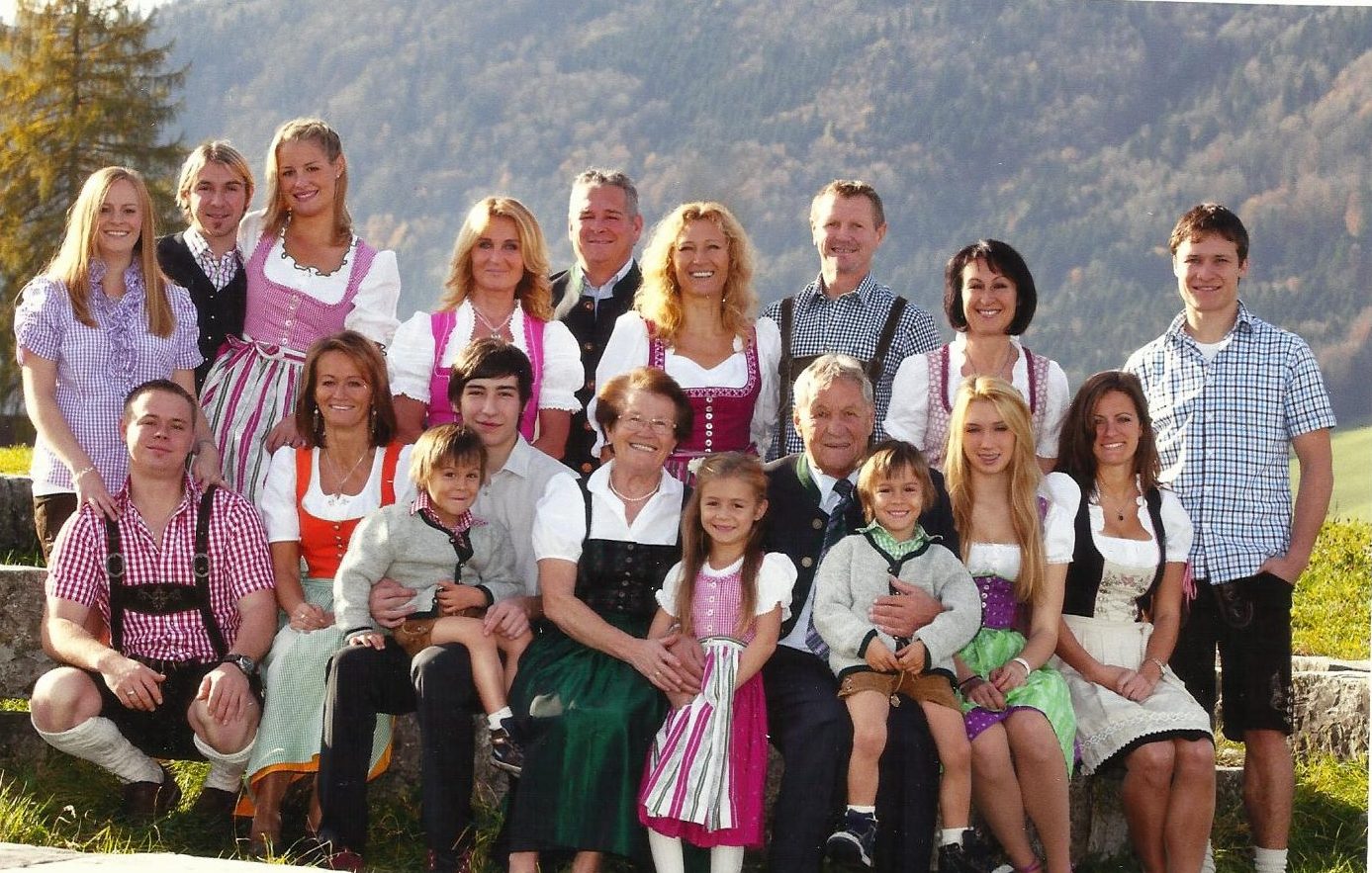
4 Responses
Very interesting story. Thank you for writing it. Make sure you keep it for your future children.
Will do, thank you Renae!
Thank you for this lovely story. I relate, as I was also born in 1939, and grew up on a rural farm in Canada where I remember hard work, ration coupons, news of the war on the radio, and walking almost a mile to a one-room school. Our life was hardly comparable given the conveniences we had, but the stories of your husband’s family and the richness in their lives by their relationships to others make this so memorable.
Thank you for your comment, Josephine! Sounds like you truly can relate to their stories. It’s interesting how people can be miles apart across the world and have such similar experiences. Thanks for sharing!